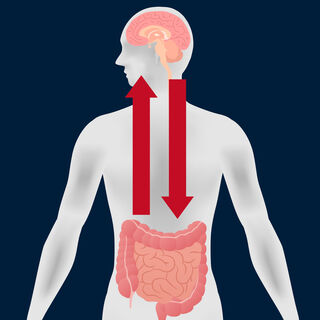Appetite
Gut-Brain Signaling via the Vagus Nerve May Affect Memories
The vagus nerve sends memory-influencing signals from the gut to the brain.
Posted October 22, 2020 Reviewed by Kaja Perina

Two new studies offer fresh clues about how a gut hormone called ghrelin is linked to changes in the hippocampus (i.e., memory hub) that can improve or impair different memory functions.
The first study (Davis et al., 2020) was published on September 17 in Current Biology and reports that ghrelin gut-brain signaling boosts hippocampal-dependent memory via the vagus nerve in rats.
The second recent ghrelin study (Hornsby et al., 2020) was published on October 20 in Cell Reports Medicine and found that "post-translational acylation of ghrelin is important to [hippocampal] neurogenesis and memory in mice."
We'll dive into the latest ghrelin-related research shortly, but first, some background: Ghrelin is primarily produced by enteroendocrine cells in the GI tract and is colloquially referred to as the "hunger hormone" because it tends to increase food intake.
When humans and other mammals are hungry, circulating levels of ghrelin in the blood tend to be high. Conversely, when the mammalian brain feels satiated after eating a meal, ghrelin blood levels are likely lower. These "hunger hormone" signals are communicated along the bidirectional gut-brain axis via the vagus nerve.
A few years ago, researchers (Rhea et al., 2018) discovered that when ghrelin crosses the blood-brain barrier, it not only regulates food intake and food-seeking behavior; it also regulates neurogenesis (i.e., the birth of adult-born neurons) in the hippocampus.
Vagus Nerve-Mediated Ghrelin Signaling Boosts Hippocampal Neurogenesis and Improves Episodic Memory
In the first study, scientists from USC studied how ghrelin communicates with the brain via vagal afferent nerves (VAN), which represent a specific vagus nerve-mediated, gut-brain pathway.
Notably, the researchers found that when vagus nerve signaling was blocked, and ghrelin messages weren't getting from the gut to the brain, lab rats tended to eat more frequently because they experienced impaired memory functions and couldn't recall their last meal.
"The animals were impaired in a certain type of memory, called episodic memory," first author Elizabeth Davis explained in an October 14 news release. "This is the type of memory that helps you remember your first day of school or what you ate for breakfast yesterday."
The latest (2020) research findings by Davis et al. suggest that VAN ghrelin signaling plays a critical role in both motivational behaviors and also promotes hippocampal neurogenesis and supports hippocampal-dependent memory.
"These findings not only identify a novel neurobiological mechanism for ghrelin's effects on various physiological and behavioral processes, but are also consistent with emerging evidence that gut peptides engage in functionally relevant paracrine signaling via the vagus nerve," the authors write.
Although this animal study advances our understanding of how ghrelin works, Davis notes that "a great deal of further research will be needed to uncover how manipulation of ghrelin signaling through the vagus nerve may be valuable in human medicine."
There Are Two Forms of Ghrelin: One Form (AG) Promotes Neurogenesis, the Other Form (UAG) Harms Newborn Hippocampal Neurons and Is Associated with Memory Loss
The second recently published ghrelin study was led by Jeffrey Davies of Swansea University Medical School in Wales. Davies and his team investigated how two distinct forms of ghrelin known as acyl-ghrelin (AG) and unacylated-ghrelin (UAG) affect neurogenesis and spatial memory in the mouse hippocampus. They also did follow-up research that tested their murine findings related to AG:UAG ratios and memory impairment in humans.
In mice, the researchers found high levels of circulating UAG reduces hippocampal neurogenesis and that "UAG blocks the AG induced survival of newborn hippocampal cells."
The good news is that increased levels of circulating acyl-ghrelin can rescue hippocampus-dependent memory deficits in mice. More specifically, higher levels of the AG form of ghrelin helped reverse spatial memory impairments. "AG-mediated neurogenesis in vitro was dependent on non-cell-autonomous BDNF signaling that was inhibited by UAG," the authors note.
To determine if these AG and UAG mouse study findings had relevance to human patients, the researchers recruited a cohort of older adults with Parkinson's disease and measured the ratio of circulating AG:UAG ghrelin in their blood plasma.
Notably, the researchers found that individuals diagnosed with Parkinson's disease dementia had a lower AG:UAG ratio in their blood compared to healthy adults. Out of three different patient groups, the Parkinson's patients with dementia were the only group with reduced AG:UAG ratios in their blood.
"Our work highlights the crucial role of ghrelin as a regulator of new nerve cells in the adult brain, and the damaging effect of the UAG form specifically," Davies concludes in an October 21 news release. "Our findings show that the AG:UAG ratio could also serve as a biomarker, allowing earlier identification of dementia in people with Parkinson's disease. [Ghrelin] represents an important target for new drug research, which could lead ultimately to better treatment for people with Parkinson's."
References
Elizabeth A. Davis, Hallie S. Wald, Andrea N. Suarez, Jasenka Zubcevic, Clarissa M. Liu, Alyssa M. Cortella, Anna K. Kamitakahara, Jaimie W. Polson, Myrtha Arnold, Harvey J. Grill ,Guillaume de Lartigue, Scott E. Kanoski. "Ghrelin Signaling Affects Feeding Behavior, Metabolism, and Memory through the Vagus Nerve." Current Biology (First published: September 17, 2020) DOI: 10.1016/j.cub.2020.08.069
Amanda K.E. Hornsby, Luke Buntwal, Maria Carla Carisi, Vanessa V. Santos, Fionnuala Johnston, Luke D. Roberts, Martina Sassi, Mathieu Mequinion, Romana Stark, Alex Reichenbach, Sarah H. Lockie, Mario Siervo, Owain Howell, Alwena H. Morgan, Timothy Wells, Zane B. Andrews, David J. Burn, Jeffrey S. Davies. "Unacylated-Ghrelin Impairs Hippocampal Neurogenesis and Memory in Mice and Is Altered in Parkinson’s Dementia in Humans." Cell Reports Medicine (First published: October 20, 2020) DOI: 10.1016/j.xcrm.2020.100120




